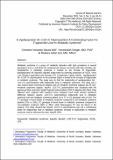Is Apolipoprotein A5-1131T>C Polymorphism A Contributing Factor For Tryglyceride Level In Metabolic Syndrome
Date
2015-12-26Author
Sibuea, Christine Verawaty
Siregar, Yahwardiah
Sari, Mutiara Indah
Metadata
Show full item recordAbstract
Metabolic syndrome is a group of metabolic disorders with high prevalence in several populations and is a risk factor for cardiovascular disease and stroke with high mortality rate. Dyslipidemia in metabolic syndrome is marked by the increase of triglycerides. Apolipoprotein A5 (ApoA5) regulates triglycerides by lowering production of VLDL (Very Low Density Lipoprotein) and increases LPL (Lipoprotein Lipase) activity. Apolipoprotein A5 -1131T>C polymorphism in the promoter region is linked to the increase of triglycerides in metabolic syndrome. This study aims to find the relationship of apolipoprotein A5 -1131T>C polymorphism with triglycerides level in metabolic syndrome.
This study was a case control study involving 50 subjects with 25 metabolic syndrome subjects and 25 non-metabolic syndrome subjects. ApoA5 -1131T>C polymorphism was visualized with 5% agarose gel after restriction length fragment polymorphism (RFLP) digested with MseI. Data obtained were analyzed with unpaired t-test.
Unpaired t-test result showed significant difference between ApoA5 -1131T>C polymorphism triglyceride level in metabolic syndrome and non-metabolic syndrome patient, be it TT or CC genotype with p<0.05. The TT genotype is found higher in metabolic syndrome compared to non-metabolic syndrome patients (72% vs 32%), CC genotype is found lesser in metabolic syndrome compared to non-metabolic syndrome (28% vs 68%), while heterozygous TC was not found in the subjects. This study showed that ApoA5 -1131T>C polymorphism was not a contributing factor for triglycerides level in metabolic syndrome. Increase in triglycerides in metabolic syndrome may be influenced by other ApoA5 SNPs.

